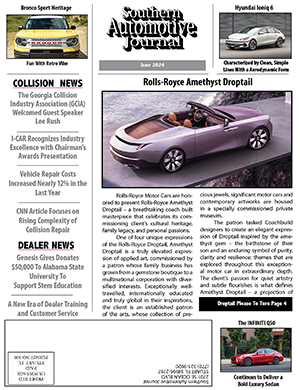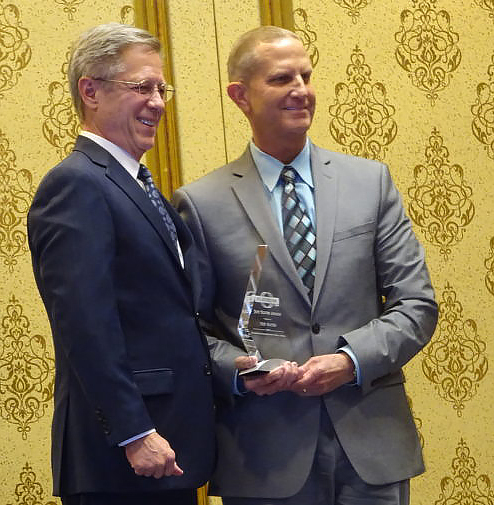The Georgia Collision Industry Association (GCIA) welcomed guest speaker Lee Rush to their March 2024 meeting held at the prestigious Governor’s Gun Club in Kennesaw, Georgia. Rush is the Strategic Accounts Manager for Multiple Shop Operators / Auto Auctions at Sherwin-Williams Automotive Finishes. This was a homecoming of sorts for Rush who worked in the Atlanta market for years and the meeting was held just down the road from his Alma Mater, Southern Polytechnic State University.
With a packed room full of GCIA members Rush wasted no time getting down to the meat of his presentation: shops have to think about business differently. With the skilled labor shortage all across North America, it is more important than ever to have your team members focused on their jobs. Now more than ever shops need to consider optimization of work flows including eliminating work delays, maximizing available skills, refining processes, improving access to materials & information, organizing shops around technicians, and prioritizing training for existing staff.
One key theme was stated over and over: keep your tech on the metal. There needs to be a focus around supporting your technician in the bay. Anything that keeps a technician from working on a vehicle is an obstacle to the business, says Rush. To illustrate his point Rush showed an eye opening graphic tracking the “chainsaw effect” that occurs as a technician starts and stops production repeatedly.
On average technician repair ramp up time takes about 45 minutes to tool up, start the process and get in the “Zone” on the metal. But whenever the tech is interrupted they have to start over, ramp back up, where another issue crops up, work stops, then has to ramp back up again. The result is a jagged tooth graph of productivity where the tech keeps getting interrupted and spends little time in their “Zone” of productive work. The goal is to remove those blockers that keep disrupting workflow, and that will likely mean change in how your shop does things.
Changing how a shop operates isn’t easy, but it is necessary to evolve. Simply organizing differently can yield significant productivity gains. “No more towers of parts, we don’t want to inventory parts or be a warehouse, '' emphasized Rush . That means no more piles of parts, boxes, or other junk on the floor. Another great organization solution is a parts cart system. Parts carts are the first step to any advanced utilization and allow for visual management across the shop. A parts cart is very deliberately organized for reassembly, not just a place to pile parts.
Shops need to consider having a separate inspection bay just for writing estimates. Rush explained it was a change in thought for how a shop sees a work bay versus an estimating bay saying “That’s where I fix cars, that’s where I find money”. By having a dedicated bay with a dedicated estimator with all their equipment at hand, the process is simplified and streamlined. Rush also touched on the importance of a detailed pre-repair inspection to make sure the repair order is as detailed as possible to prevent going back and forth for multiple supplements. It was a lot to take in, but Rush’s presentation gave attendees a lot to think about and try in their own shop.
In GCIA business news it was announced that board member elections had been held. Taking the helm as President is Chad Watkins. This year GCIA is looking at options for holding meetings outside of the Atlanta metro area. A survey was sent to members and locations are being considered for future meetings. The next GCIA meeting will be held June 18th, 2024 at a location as yet to be determined. If you want to find out what is happening in the Georgia collision market, becoming a GCIA member should be at the top of your list. With more than 40 members and growing, GCIA has its finger on the pulse of Georgia. For more information on joining GCIA visit www.gcia.org.n |
|

